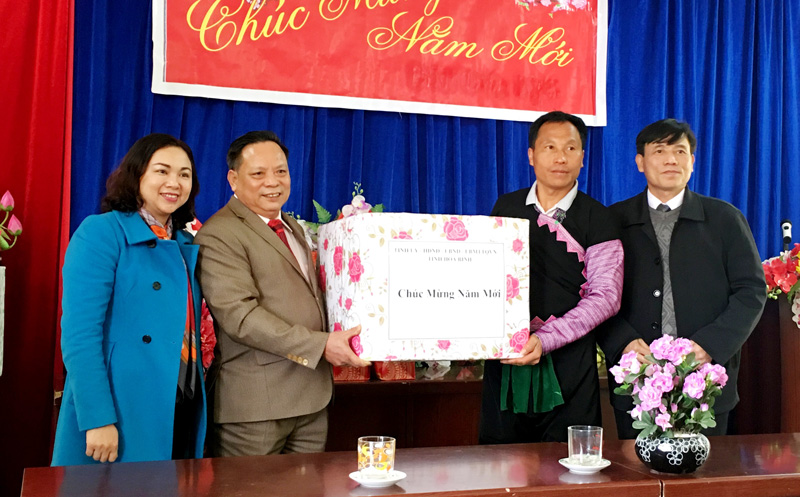
(HBO) – On 18th of January (it meant December the 2nd in Lunar Calendar), with the commission of the provincial Party, the People’s Committee, The People’s Council, the provincial Fatherland Front Committee, the delagation led by Mr. Hoang Quang Minh – The Head of the provincial Ethnic Committee – visited, encouraged and congratulated on Tet occasion to the Party, authorities and local people of 2 communes Hang Kia and Pa Co (Mai Chau District) on the occasion of Mong ethnic people’s traditional Tet.
The delegation giving Tet presents and congratulating the Party, authorities and local people of Hang Kia commune.
The delegation giving Tet presents and congratulating the Party, authorities and local people of Pa Co commune.
Hang Kia and Pa Co, where many Mong ethnic people are living, are two highland communes with many difficulties in Mai Chau district. Over the past years, with the attetion, support of the Parties, authorities at many levels and the investments in programs, projects and ethnic policies, the economic and social conditions in 2 communes have changed positively, gradually increase the material and spiritual living conditions for Mong ethnic people here.
The traditional Tet of Mong ethnic people starts from Lunar December the 1st and lasts until the end of the month. This is an opportunity for people early to organize many activities with special cultural values, expressing the tradition and high spirit of solidarity. On this occasion, the provincial delegation visited, gave Tet presents and expected Mong ethnic people in 2 communes of Hang Kia and Pa Co to have a joyful, economical and safe traditional Tet in order to begin a new year with full happiness and success.
Hoa Binh province is undergoing a dynamic transformation amid Vietnam’s national digital transition. Building on Poliburo’s Resolution No. 57-NQ/TW on breakthroughs in science, technology, innovation, and national digital transformation, the province has rolled out a wide range of practical action plans. A standout initiative is the "Digital Literacy for All” movement, an effort to ensure that no one is left behind in the digital era.
Hoa Binh province is undergoing a dynamic transformation in the wake of the national digital transformation movement. Building on Resolution No. 57-NQ/TW of the Politburo on breakthroughs in science, technology, innovation, and national digital transformation, the province has implemented a wide range of practical action plans. A standout initiative is the "Digital Literacy for All” movement ambitious effort to ensure that no one is left behind in the digital age.
With a spirit of unity and proactive problem-solving, the Party Committee, the government and the people of Dong Lai Commune (Tan Lac District) have made great strides in implementing the resolutions of the 24th Party Congress of the commune for the 2020 - 2025 term. Focusing on leadership and practical actions, the commune has brought the Party’s resolutions into daily life, creating strong impacts and pushing the local development forward.
Amid the nationwide push for digital transformation, young people in Hoa Binh Province are stepping up as dynamic pioneers, applying technology to enhance Youth Union operations and expand the reach of youth-led initiatives. Through creativity and adaptability, Youth Union organizations at all levels have introduced a series of practical solutions, contributing to modern governance and community development.
In recent years, An Nghia commune, located in Lac Son district, has stepped up administrative reform, focusing on improving the quality and efficiency of its single-window service unit for receiving and processing administrative procedures. These improvements have helped create favourable conditions for local residents and organisations to handle administrative procedures, contributing to the commune’s broader socio-economic development.
The Prime Minister-approved master plan to develop the multi-use value of forests ecosystems through 2030, with a vision to 2050, aims to improve the management and sustainable use of forest resources, create jobs, increase incomes, and improve the living standards of ethnic minorities, people in mountainous and remote areas, forest workers and those living near forests.




